What President Oprah Winfrey would mean for LGBT rights
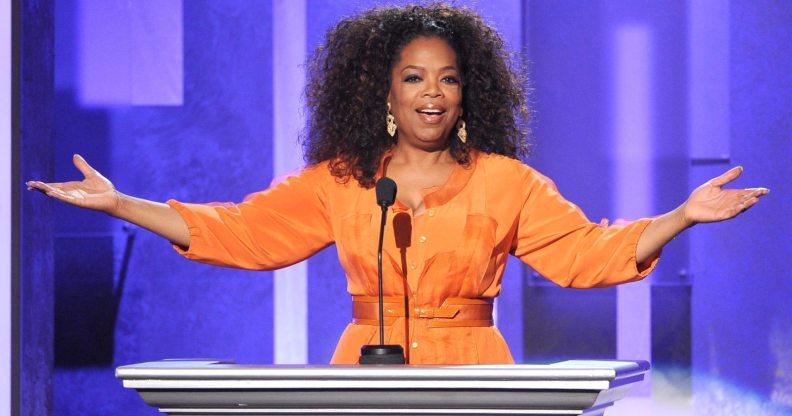
(Kevin Winter/Getty Images for NAACP Image Awards)
The Democrats are without a serious star player to take on Donald Trump in the 2020 election.
But beloved talk show host, media entrepreneur and businesswoman Oprah Winfrey burst onto the list of frontrunners in January with a defiant speech at the Golden Globes.
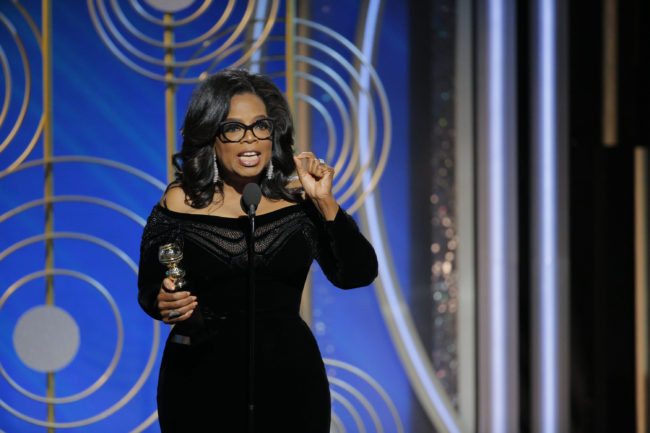
(Photo by Paul Drinkwater/NBCUniversal via Getty Images)
Winfrey, who is as close to universally admired as pretty much anyone gets in the USA these days, has fuelled speculation by refusing to rule out a Presidential bid – and sources close to the star say she is considering the matter very seriously.
Polling suggests she’d trounce Donald Trump in a one-on-one race, which will only increase pressure to run if no other serious contender emerges.
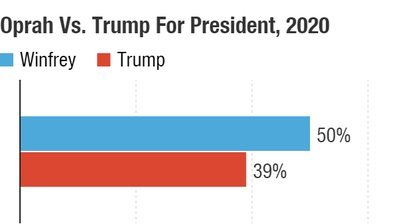
A NPR/PBS NewsHour/Marist poll gives Oprah an 11-point lead
So, if we’re taking this seriously, let’s ask: what’s her record like, and what would President Oprah mean for LGBT equality?
An early and unwavering ally
Obviously Oprah has never been in Congress, so she doesn’t have a voting record for us to pick through – but luckily pretty much every thought she’s publicly expressed for the past three decades has been meticulously documented in the press.
The star was one of Hollywood’s earliest and most prominent LGBT allies, giving a platform on her show as far back as 1991, when she held a pioneering discussion about same-sex marriage.
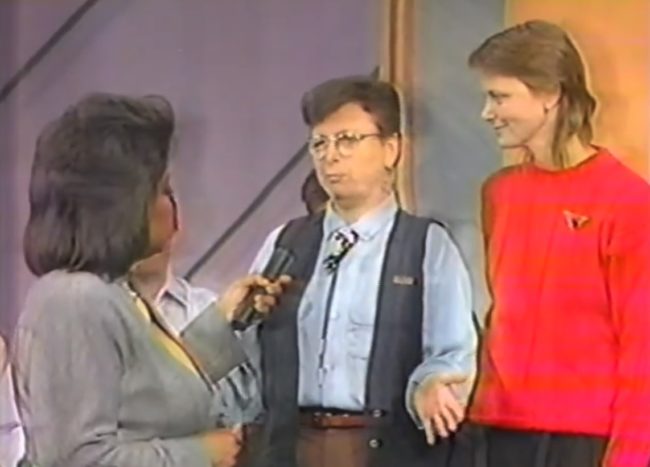
In the episode, which aired more than two decades before marriage equality would become legal across the USA, Oprah spoke to lesbian couple Sally Hudson and Jennifer Quall, who exchanged vows despite the ban on gay unions.
In the episode, Oprah can be seen patting a woman on the back who says, “Accept them, love them, let them explain how they feel about each other.”
Six years later, in 1997, Oprah interviewed Ellen DeGeneres as she came out as a lesbian – a watershed moment in the history of the LGBT rights movement considered by many to be the key turning point for gay equality.
A prominent Christian, Oprah has also been clear in condemning the use of religion to spread homophobia.
When she was challenged by a homophobic Christian over her support for LGBT rights, Oprah responded on-air: “I have a different view of ‘Christian’ than you do. The God I serve doesn’t care whether you’re tall or short, or whether you were born black or Asian or gay.
“I believe God created Ellen. I believe God did that. If Ellen says she’s gay, I believe God created her gay. I believe God did that. I support her right to be who she thinks she is.”
She’s been an unwavering supporter ever since, really – broadcasting a consistent message of respect, equality and decency.
As she said in her Golden Globes speech: “What I’ve always tried my best to do, whether on television or through film, is to say something about how men and women really behave. To say how we experience shame, how we love and how we rage, how we fail, how we retreat, persevere, and how we overcome.
“I’ve interviewed and portrayed people who’ve withstood some of the ugliest things life can throw at you, but the one quality all of them seem to share is an ability to maintain hope for a brighter morning, even during our darkest nights.”
An end to the Trump madness?
Despite her star power, the first thing that President Oprah brings to the table really isn’t much different to any other moderate Democrat – an end to the madness of the Trump administration.
Driven partly by conservative evangelical lobbying groups, the Trump-Pence White House has been fighting against the tide of public opinion by working to undermine LGBT equality.
Whether it’s banning transgender people from the military, censoring federal agencies’ work on LGBT issues, shutting down the work of HIV experts, or actively working to undermine civil rights protections for LGBT people, the current White House administration has been the most damaging for equality in more than a decade.
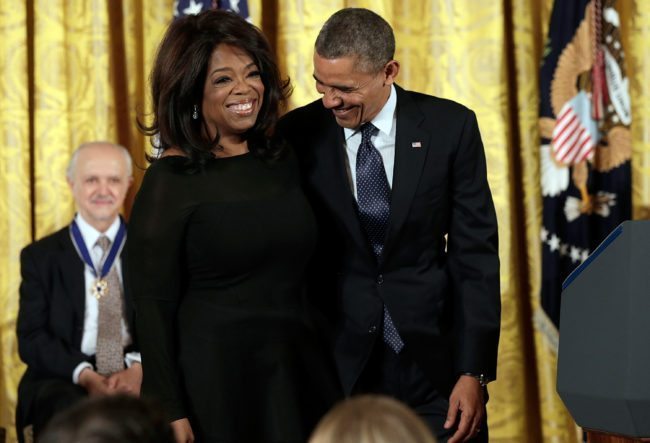
U.S. President Barack Obama (R) awards the Presidential Medal of Freedom to Oprah Winfrey (Photo by Win McNamee/Getty Images)
Pretty much any moderate, pro-LGBT politician would bring an end to the crusade.
They would give Attorney General Jeff Sessions his marching orders, putting an end to his attempts to use the Justice Department to undermine discrimination protections for gay people.
They would veto the First Amendment Defence Act, a law Trump has pledged to sign that bans government from taking “any “action against a person” who has discriminated against gay couples
And they would probably ensure that global LGBT rights are on the table again, helping fill the void left by America’s abdication of responsibility.
A radical agenda for the future
But Presidents are not defined simply by undoing the work of the leader who came before them.
Though she lacks a political background, a President Oprah could draw on guidance from activists together with a likely-experienced Vice President, to forge a truly radical agenda going forward.
She has a wide pool of talent to draw from – LGBT allies like Elizabeth Warren, Kamala Harris, Kirsten Gillibrand or Cory Booker would all make fine VPs for Oprah.
To imagine what a progressive, expert-driven platform on LGBT rights would look like, we don’t have to look far: in fact, we seem to recall one was on offer in 2016.
Like her or loathe her, ahead of the election Hillary Clinton released an extremely detailed policy document of proposals on LGBT issues that President Oprah would be wise to crib from.
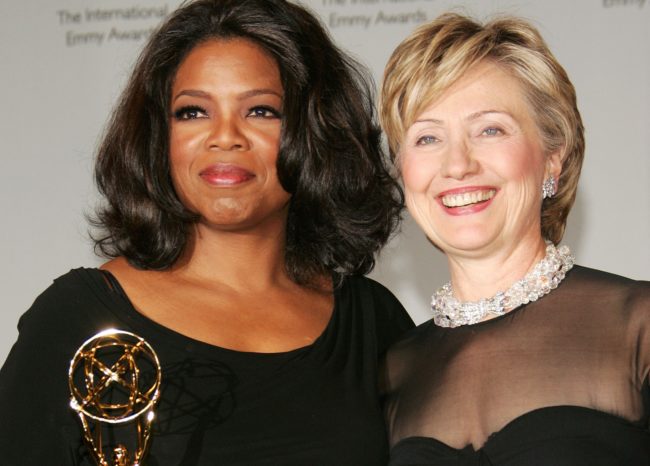
Oprah Winfrey poses with Hillary Rodham Clinton (Photo by Evan Agostini/Getty Images)
The Democratic candidate vowed to veto the First Amendment Defence Act, and has pledged to sign the Equality Act – a bill that would amend the Civil Rights Act of 1964 to outlaw discrimination based on gender identity and sexual orientation across all areas, including employment, housing, schools, access to credit, public education, jury service, and public accommodations.
And she pledged to ensure global LGBT rights is a key focus of the US foreign policy agenda. In addition to applying soft power, Clinton pledged a $50 million boost for the Global Equality Fund, which supports programmes that advance the human rights of LGBT persons abroad.
On transgender rights, Clinton’s plan proposed an overhaul to streamline the process for transgender people to gain legal recognition, helping to eliminate obstacles in employment, health care, education, housing, and voting.
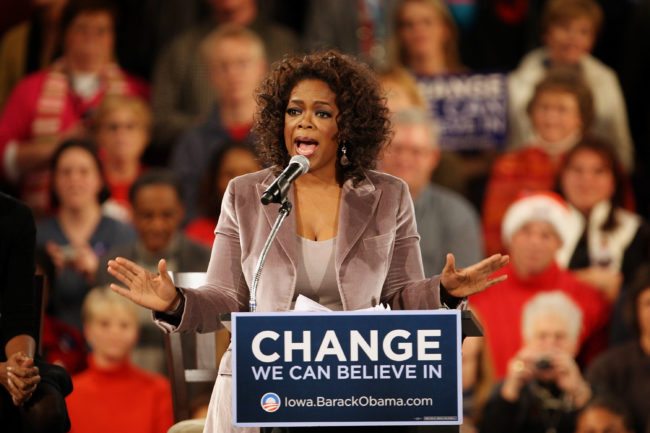
Talk show host Oprah Winfrey addresses a crowd gathered at a rally for Democratic presidential hopeful Sen. Barack Obama December 8, 2007 in Des Moines, Iowa. (Photo by Scott Olson/Getty Images)
The candidate also had a detailed, expert-led plan on HIV/AIDS, targeting vulnerable LGBT communities, promising funding for research and HIV-preventing PrEP drugs to create an “AIDS-free generation”.
Her plan on HIV/AIDS included a cap on out-of-pocket expenses for people with HIV/AIDS, vastly reducing the cost of healthcare, and ensuring Medicaid coverage for people living with HIV.
There are still other definitely things that could be improved on beyond Clinton’s plan: Oprah, feel free to give our friends at the Human Rights Campaign a call if you need ideas.
A voice on the global stage
Oprah’s never been afraid to challenge people with opposing views, and as Leader of the Free World she’d have plenty of opportunities to make good outside of the US.
The current White House has been sluggish at best and negligent at worst when it comes to raising human rights abuses against LGBT people.
Despite attacking his opponents over links to the homophobic regime in Saudi Arabia, Trump has done nothing but gush praise since coming to power, forgetting to raise the issue during his trip in 2017.
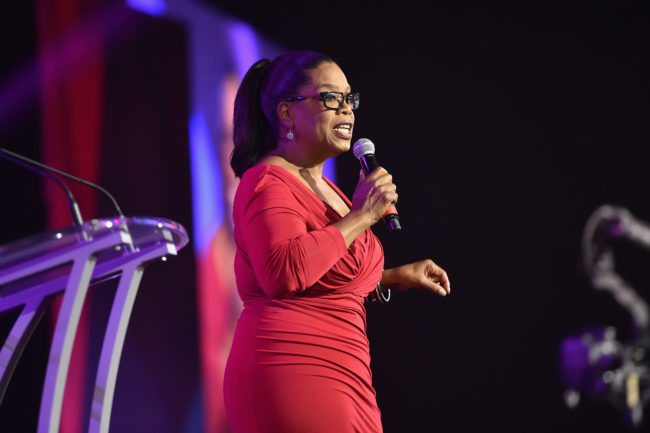
Oprah Winfrey (Photo by Paras Griffin/Getty Images for 2016 Essence Festival)
And nearly a year on from reports of homophobic purges in Chechnya and worsening conditions for gay people across Russia, the leader has never mentioned the issue in his one-on-ones with Vladimir Putin.
We can’t help but hope that a President Oprah would be more willing to defend basic freedoms on the world stage, deploying some of her star quality for the greater good.
Should Oprah, like, actually be President, though?
We’d be remiss if we didn’t mention that since this whole Oprah 2020 movement begun, there’s inevitably been a bit of a backlash, as BuzzFeed’s Ben Smith quite eloquently lays out.
We like to think that Oprah could probably learn to be a great President, but should she be running in the first place?
As titanic as a Trump v Oprah election sounds, the fact remains that neither of them really has the qualifications or experience usually expected from world leaders.
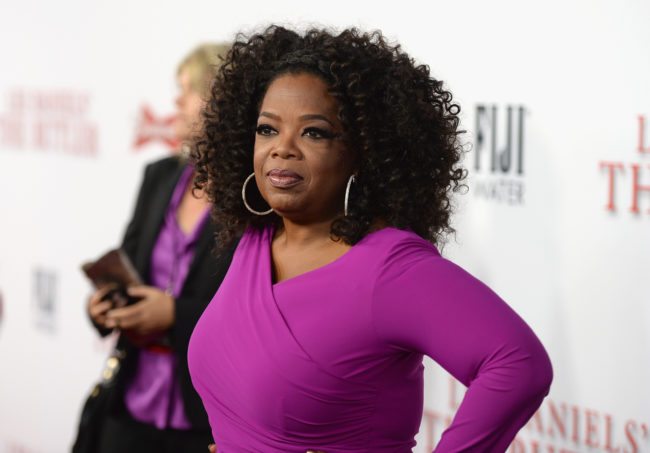
Oprah Winfrey (Photo by Jason Kempin/Getty Images for FIJI)
America has had two celebrity Presidents now; former actor Ronald Reagan, whose indefensible silence during the AIDS crisis likely cost thousands of gay men their lives, and former reality TV personality Donald Trump, whose hypernationalist agenda and nuclear threats seem at times even more reckless and potentially deadly.
Given the past year, many would likely welcome a return to leaders who have experience, who have done their time in Congress or state leadership, and who have policy knowledge and a record of delivery.
And rather than celebrity slagging matches, perhaps elections should be about giving the job to the person who is most qualified, and whose policies will do the most good for the American people.
But we’ve already had an election where Donald Trump went up against an establishment politician with oodles of experience and knowledge, and, spoiler alert, it did not end well for them.
Really, if it comes down to President Oprah or another four years of Trump… we know who we’d promote.


